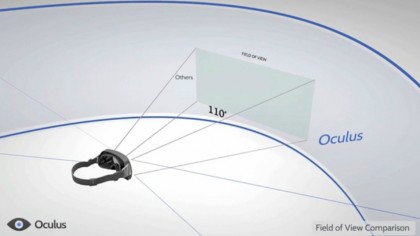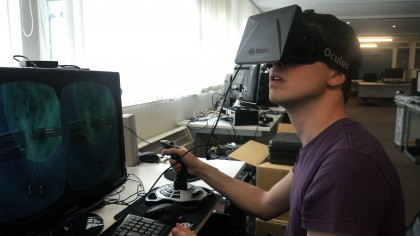Oculus Rift creator: Xbox One and PS4 are far too limited for what we're planning
A Q3 2014 release is in the diary and time is ticking...
"The problem with consoles in general is that once they come out they're locked to a certain spec for a long, long time. Look at the PCs that existed eight years ago. There have been so many huge advances since then. Now look at the VR hardware of today. I think the jump we're going to see in the next four or five years is going to be massive, and already VR is a very intensive thing, it requires rendering at high resolutions at over 60 frames a second in 3D."

Resolutions have been a big talking point these past few weeks, with the Xbox One performing below the standards of the PS4 in Call of Duty Ghosts, and raising concerns that it might not have enough power for the next console decade.
"We're seeing games that are already saying they're gonna run in 720p on next gen so they can barely hit 60 in 2D," says Luckey. "It's hard to imagine them running a VR experience that's on par with PC. And certainly five years from now the experiences and the technology for virtual reality that will be available on PC is going to be be so far beyond anything that a console can provide.
"What we're most excited about - really the core direction of our company - is trying to make something that works on platforms that are moving quickly and that are continuously getting more powerful, and consoles are not those."
Ok, but would we lump Valve's Steam Machines in with the other next-gen systems?
"We're good friends with Valve," laughs Luckey when we ask if the relationship with Gabe Newell could be closer than they're letting on right now. "We're great friends with them."
Guts on the headset
Luckey's equally cagey when we ask him to tell us his favourite Oculus experience so far, which is perhaps most intriguing of all. "I can't say. There's a lot of things going on that are not necessarily announced yet."
Get daily insight, inspiration and deals in your inbox
Sign up for breaking news, reviews, opinion, top tech deals, and more.
Something beyond the PC, perhaps? New talk about the mobile possibilities of Oculus have given the headset a second wind of early hype, but just how viable is a mobile Oculus Rift?
"It's not going to happen immediately but the long term future of virtual reality is going to be building basically mobile chip sets into these headsets themselves so that they're dedicated and not tethered to something else," says Luckey.

"If you look at the rate of how fast mobile phone technology has been advancing, I would be willing to bet that by the end of this console generation there are going to be mobile processors that far outpower them.
"And they upgrade every single year. So when you have VR hardware that's getting better every year and mobile processing power that's getting better every year, it won't be too many years before you can get a much better experience than a console in a headset that has everything built into it and is still cheaper than a console."
He might be just 21, but it's difficult to argue with Luckey's cynical outlook on the fate of current unified consoles - or ignore his optimism that Oculus could move from being a tethered peripheral to a console of its very own.
In his own words, "putting the guts on the headset is going to be the future."
Hugh Langley is the ex-News Editor of TechRadar. He had written for many magazines and websites including Business Insider, The Telegraph, IGN, Gizmodo, Entrepreneur Magazine, WIRED (UK), TrustedReviews, Business Insider Australia, Business Insider India, Business Insider Singapore, Wareable, The Ambient and more.
Hugh is now a correspondent at Business Insider covering Google and Alphabet, and has the unfortunate distinction of accidentally linking the TechRadar homepage to a rival publication.
